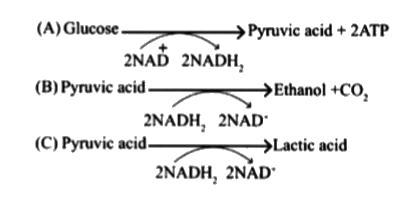Fermentation involves

A
Only (B) and (C)
B
Only (B)
C
(A) and (B) only
D
(A), (B) and (C)
Text Solution
The correct Answer is:D
Anaerobic respiration:
In microorganisms, anaerobic respiration is often called fermentation. Anaerobic respiration is an enzyme controlled, partial breakdown of organic compounds without utilising oxygen and releasing only about 7% energy of glucose. It is also called intra-molecular respiration. In this process, a net gain of 2 ATP occurs, as is reformed to continue glycolysis. Anaerobic respiration occurs in the roots of some water-logged plants, certain parasitic worms (Ascaris and Taenia), animal muscle and some microorganisms (bacteria, moulds). The anaerobic respiration starts from glycolysis and their end products are as follows:
(i) Formation of ethyl alcohol: When oxygen is absent, yeast converts pyruvic acid into ethanol. This is a two-step process, as explained below:
(a) In the first step, pyruvic acid is decarboxylated to yield acetaldehyde and , in the presence of and thiamine pyrophosphate in the pyruvate carboxylase complex.
(b) In the second step, acetaldehyde is reduced to ethyl alcohol by formed in glycolysis.
(ii) Lactic acid fermentation: In this process, the lactose sugar, present in the milk, is converted into lactic acid, which provides a distinctive sour taste to the milk. Lactobacillus acidophilus takes part in this process. Lactic acid is produced in the muscle cells of human beings and other animals. During strenuous physical activity such as running, the amount of oxygen delivered to the muscle cells may be insufficient to keep pace with that of cellular respiration. Under such circumstances, lactic acid is formed which accumulates in the muscle cells and causes muscle fatigue.
(iii) Butyric acid fermentation: It occurs in butter which has turned rancid. Bacteria like Clostridium butyricum is responsible for fermenting sugars and lactic acid into butyric acid.
(iv) Acetic acid fermentation: It is different from other types of fermentation as it utilizes atmospheric oxygen. Acetic acid fermentation is catalyzed by Acetobacter aceti and A. xylinum, which oxidized ethyl alcohol into acetic acid.
|
Topper's Solved these Questions
Similar Questions
Knowledge Check
Fermentation is
AAnaerobic respirationBIncomplete oxidationCComplete oxidation of carbohydratesDNone of the aboveFermentation is
AIncomplete oxidationBAnaerobic respirationCExcretory processDNone of the aboveFermentation is an
AIncomplete oxidationBAnaerobic respirationCExcretory processDNone of the above
